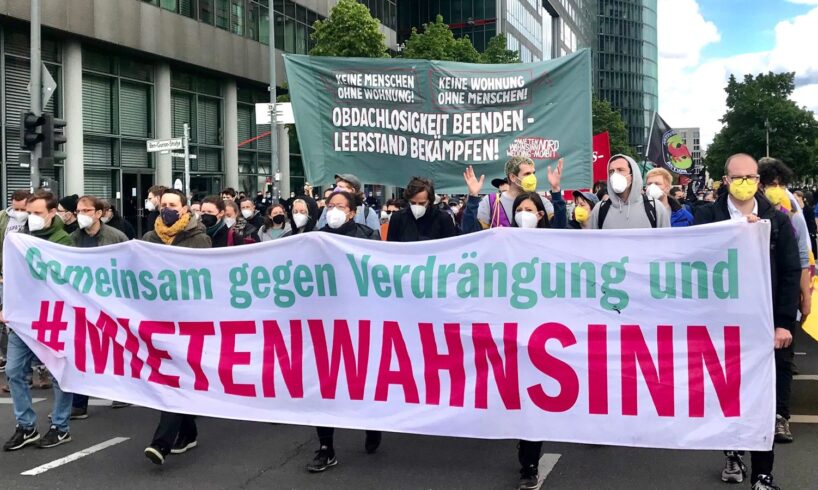
Demonstration against high rents in Berlin, September 2021. Banner reads: “Together against Displacement and #CollectiveMadness”
The German government is planning a reform of the citizen’s allowance (Bürgergeld) welfare payments, which would cut housing support for the poorest households. In the face of rapidly rising rents, this represents a social catastrophe for a growing number of families.
According to plans drawn up by the ruling coalition of the Christian Democrats (CDU/CSU) and Social Democrats (SPD), the housing support element within Bürgergeld is to be reduced. In the traditional summer interview with broadcaster ARD last month, Chancellor Merz (CDU) had already advocated capping rental support as part of a comprehensive reform of Bürgergeld.
Bürgergeld, which is available to people with little or no income, is at the centre of the government’s social cuts. It is to be downgraded this year to a kind of “basic social security.” This means that the roughly €40 billion budgeted for 2024 will be drastically reduced. A double-digit billion-euro sum is to be saved through the capping of rental payments for those in need.
Accompanying these plans for a brutal attack on the poorest layers is a foul and deceitful campaign about alleged “luxury rents” for Bürgergeld recipients, spearheaded by CDU circles and right-wing media. For example, North Rhine-Westphalia state Prime Minister Hendrik Wüst (CDU) recently demanded that the state should “no longer pay for very large and very expensive apartments for Bürgergeld recipients.”
In the ARD summer interview, Merz claimed that Bürgergeld recipients in major cities received up to €20 per square metre from the “welfare office” for a 100-square-metre apartment, which a “normal worker’s family” could not afford.
Merz is deliberately stirring up envy against the poorest, who are supposedly living in luxury, in order to justify cuts. The reality, of course, is very different.
Market rents have exploded over the past three years, and affordable housing is scarcely available. On average, asking rents in Germany rose by 18.3 percent. In Munich, they are now around €20 per square metre, making the Bavarian capital the most expensive city in Germany. Other expensive cities include Frankfurt am Main and Stuttgart. Berlin ranks 10th for highest asking rents: since early 2022, they have risen by 42.6 percent to an average of €14.90 per square metre.
In Berlin in 2024, there was a significant gap between market rents and existing rents. The average existing rent is €7.21 per square metre. Many tenants remain in their cheaper apartments because moving would mean significantly higher rent.
Cities such as Kaiserslautern and Cottbus also saw substantial increases—41.7 and 41.3 percent respectively. Average rents now stand at €10.05 (Kaiserslautern) and €8.86 (Cottbus). This shows that rent increases are not only occurring in major cities but also increasingly in medium-sized and smaller cities. Inward moves from more expensive urban areas are driving prices even higher.
While more and more households must spend over half their income on rent, the coffers of the property corporations are filling up. Rising rental income has produced record profits for Germany’s two largest real estate companies this year.
Vonovia’s adjusted pre-tax profit rose by around 11 percent to €984.3 million. By the end of the year, it is expected to reach €1.85 billion to €1.95 billion, an increase of around €100 million over the original forecast, according to finance daily Handelsblatt.
LEG also reported a 15.4 percent rise for the first half of the year. Overall, the second-largest German housing company’s profit rose to over €448 million.
This development is politically intended. Federal and state governments work closely with the real estate lobby, and even minimal interventions that would affect the profit interests of property corporations are avoided.
At the same time, despite growing demand, almost no new housing is being built. The previous government of the SPD, Greens and Liberal Democrats (FDP) intended to build 400,000 new homes annually, including at least 100,000 social housing units. This target was significantly missed from 2021 to 2024. In each year from 2021 to 2023, fewer than 300,000 new homes were built. In 2024, the number was only 251,900.
Furthermore, Bürgergeld recipients already often receive only part of their actual rent costs. They must pay the difference from their miserably low standard allowance.
According to the federal government’s response to a parliamentary question from the Left Party, Job Centres last year did not reimburse 334,000 households entitled to Bürgergeld for the full cost of their rent. This affects 12.6 percent of all households receiving basic social security payments.
On average, these households had to pay €116 per month on rent out of their standard allowance. For a single adult with a current standard allowance of €563, this means a reduction to less than €450.
Job Centres justify this by claiming they may only cover “reasonable” housing costs. However, this criterion is not uniformly regulated but individually determined by each municipality. Those affected must then pay the difference out of their own pockets.
This so-called housing cost gap in Berlin averages €180—Bürgergeld recipients there must cover over 23 percent of actual accommodation and heating costs themselves.
The consequences of this policy are already devastating.
In Berlin alone, there were 2,371 evictions in 2023; in 2024, there were 2,495—an increase of 5.2 percent. Nationwide, the number rose from 32,669 in 2023 to 35,006 in 2024, an increase of 7.1 percent.
This trend is reflected in growing homelessness. At the start of the year, Berlin reported 15,710 homeless minors, 16.5 percent more than the previous year (13,480). Overall, more than 50,000 people in Berlin currently live without a permanent home, at least 30 percent of whom are children and young people. The Berlin Senate (state executive) estimates that the number will rise to over 87,000 by the end of 2029, yet no countermeasures are being taken.
The so-called Housing First project, launched in 2018, is little more than a token measure. So far, it has only housed 227 homeless people. At the current pace, it would take over 1,500 years to house all the homeless in Berlin in this way.
The planned attacks by the Merz government on the last remnants of the welfare state will further exacerbate this crisis. The money saved on housing, education and health will flow directly into military rearmament.
The federal government plans to triple military spending within five years. The NATO target of 5 percent of GDP for military and war-related expenditure is to be reached by 2029, and not as originally planned in 2035. To achieve this, the military budget is to rise from the current €86.5 billion to over €150 billion.
Sign up for the WSWS email newsletter





